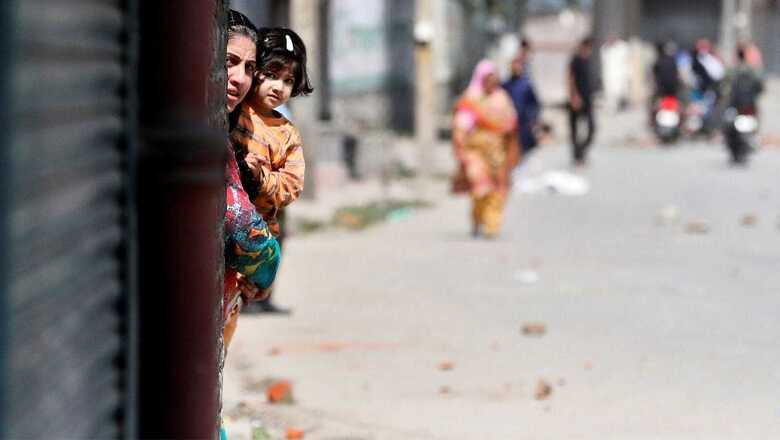
views
My story starts in March 1989, when I was born, and it ends on the interim night of January 19, 1990, just when my parents held me tightly in their hands and boarded a van for Jammu. The doors to the vehicle opened the doors to our poverty, struggle, disease and neglect for the next 30 years and counting, with Kashmiri Pandits becoming India’s largest-ever population of internally displaced people. It opened avenues for successive governments to abuse our collective trauma, to give us hope like shots and take it back in insulting ways like not even trying the crimes in court.
They say, don’t let tragedies define you. They say, do not let your past control your future. But what do you do when a nightmare gets stuck in your reality? When you find your poverty staring at you wearing shackles from the past? You don’t accept it. You fight it. But the fight tires you, makes you weak and you succumb to fate. And you accept your tragedy as your ultimate reality. That’s what happened to lakhs of undocumented migrants over the course of many months in 1990. Irreversible losses to life, academics, dignity, property, friendships and family structure resulting from the echoing announcements replacing the sounds of evening azaan: the choice of raliv, galiv ya chaliv (convert, die or escape) from a majority of mosques in the valley of Kashmir.
A few lucky ones fled to Delhi/Mumbai/Dehradun with the help of friends in the Valley who literally had to smuggle them out, risking their lives, in the dead of the night. But not all were lucky. Young promising boys like my uncles were tied up, threatened at gunpoint by terrorists to leave the Valley with their families, or they would be killed and their sisters and mothers would be raped. They eventually either didn’t make it or got lost in the shanty Muthi camp or the lanes of Buta Nagar, managing on ration and menial jobs against their gold medal degrees of no use. These degrees and old photographs from the Valley, their childhood being locked in the rusty trunks covered by an old tattered saree long forgotten, stained by unfairness.
The death of secularism in Kashmir saw its shadows in the burnt Pandit houses, lonely belongings on Habba Kadal roads for months at a stretch open for selling, after the owners had settled in the dingy camps – unaware that their memories were being sold at these prices. It also saw its shadows in the glamorisation of people like Bitta Karate and Yasin Malik. Also, to the respect and jobs that militants secured due to various backdoor entries. Kashmir, as a result, devolved from a modern society into a cow that everyone milked for their business from time to time. Selective outrage, even after all these years, a political cocktail, even after all these years, have done nothing for the Pandit woman who has an ailing husband to look after, a delusional mother-in-law who still thinks she lives in Chanpora, or an ignorant son who thinks he has nothing to do with Kashmir, because he can neither speak the language, has no relation to the place or even memories of his ancestral land, who still thinks it’s not Anantnag, it’s Islamabad.
Anyway, Jammu, the next stop for most after migrancy, in those makeshift tents for a long time, was hot and nothing like what they were prepared for. A lot of Kashmiris recall the first summer of 1990 in Jammu as skin-peeling, roasting, hot fumes engulfing the whole tents, the heatwave killing some in the process, making others suicidal too. I, for example, remember Jammu for being accommodating but with a smirk. There was always discomfort on the landlords’ faces, sometimes sending the vibe that they thought we weren’t worthy of walking on their precious marbled floors. We had to speak in hushed voices to not disturb them or not have drawn something on the walls – like normal kids do. We couldn’t touch the flowers in their gardens or couldn’t stop them from checking our refrigerators when parents were out. It was normal for me, because I hadn’t seen anything else even for example’s sake. It was my whole world for fifteen years, shifting eight houses, loading trucks and thelas from one house to another. Some thelas survived multiple shifts too – tough like us (the kids). As a result, I desired all those years just for my own house – a place to belong, a gate where my dad’s nameplate would exist too.
I remember being cross with my parents, in a way, childishly blaming them for my poverty, especially when they told me about how they had three-storeyed houses at four places in Kashmir before they were all either burnt or sold away for a pittance. Some of my relatives used to live at Purkhoo camps and I secretly wanted to live in those tin-roofed rooms with public restrooms there because they didn’t have a neighbour to mock their poverty or culture. But not everything was depressing – my father, just like thousands of other Kashmiri fathers, taught me the power of the pen and hard work. That’s why we are here today – against all odds, surviving, even though that means opening up the Jammu newspaper every morning to find some more people dying away from their homeland. And we take that sheer chai sip with one eye to the door and the other at the weather of Kashmir.
My daughter recently got fascinated with tents and she made us order one. I guess I will never like a tent – ever.
(Khushboo Mattoo is a Consulting Editor with Network18 and a lifelong student of art. She loves sheer chai and the sound of rabab. She is vocal about everything that involves equality.)
Read all the Latest News, Breaking News and Coronavirus News here.




















Comments
0 comment